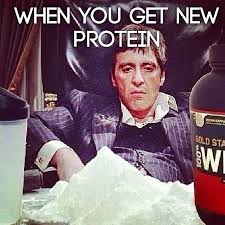Hello! Happy September! (I know, it’s a little late for that–sorry guys!)
I love getting fitness questions from my clients and friends. I recently got a great question from Leslie about protein powders. Specifically, she wanted to know what types are best for recovery, satiety, and purity of ingredients.
Protein Powder Breakdown
If you have any dietary concerns, the first issue to address is the source of the protein powder. Whey, cassein, egg, and beef protein are animal source protein powders. Vegetarians would want to consider a protein powder made from soy, peas, hemp, and rice. Soy has gotten a bit of a bad rap in the past few years due to claims of effecting testosterone levels in men, and rumored breast cancer concerns for women. There has also been some controversy regarding arsenic in rice products. However, the FDA has released a report claiming the levels of arsenic in rice powders are too low to cause “immediate health damage”. As for soy, I’ve never seen anything definitive about any side-effects. This short article from cancer.org sums up there findings on the soy-cancer connection.
My personal preference has always been for whey protein, which tastes the best, and since it absorbs into the digestive system quickly, is a popular choice for people post-workout. Casein is the other milk-derived protein and absorbs more slowly into the digestive system, so it may be preferable for people who are using it for weight-loss or control. Personally, casein shakes are too rich for me, so if I do use casein, I like it blended with whey. PS, I have nothing against veggie protein powder except for the taste, which is awful.
Kefir
If you’re looking for a pure, whole-food protein source for your skakes, you should definitely try Kefir. I loathe the phrase “super-food” but if I had to use it, it would be to describe kefir.
Kefir is a fermented milk drink from India, famous for it’s tart taste and impressive levels of gut-loving probiotic bacteria. A cup contains 10 grams of protein, so I also add about a 1/4 scoop of protein powder just to bump that amount up a bit. I recommend getting plain and then adding frozen fruit and a little maple syrup for sweetness, rather than the pre-sweetened varieties. If kefir is too tart, you can sub it out with greek yogurt and some milk instead.
Once I blend it with frozen fruit, my kefir/yogurt shake reminds me a lot of the taste of the frozen yogurt from Red Mango or Pinkberry. Kefir also has a lot of naturally occurring vitamins and minerals (vitamin A, D, iron, magnesium, and more) so I feel pretty darn good about myself after I drink a shake–and I don’t just throw around words like “darn” without meaning it.
Probiotic Health Shake
The kefir and cherries in this shake are great combo for muscle recovery. I love this shake after deadlift day!
1 cup plain kefir (or 1/2 cup of greek yogurt + 3/4 cup milk)
1/4 to 1/2 scoop of vanilla protein powder
1/2 frozen banana
1/4 cup frozen cherries
This shake comes out super thick, you can thin it out with a splash of milk or eat with a spoon 🙂
So, now you know, Leslie. Kefir + a little whey+frozen fruit=a perfect breakfast, snack, or post-workout recovery meal. If you give this recipe a try, please let me know what you think!
Tweet me at AmyBlitz1. Check me out at Insta: blitzyourbody or Facebook.com/blitzyourbody

